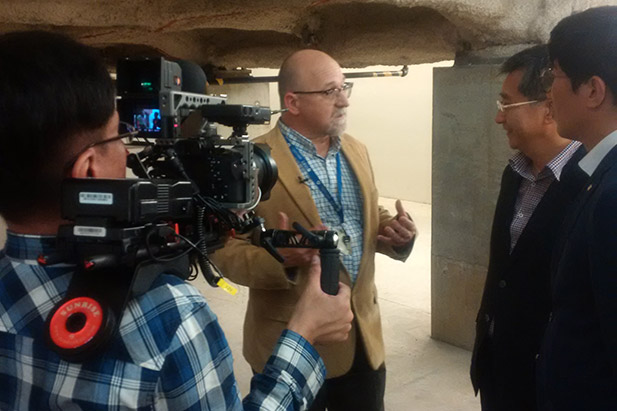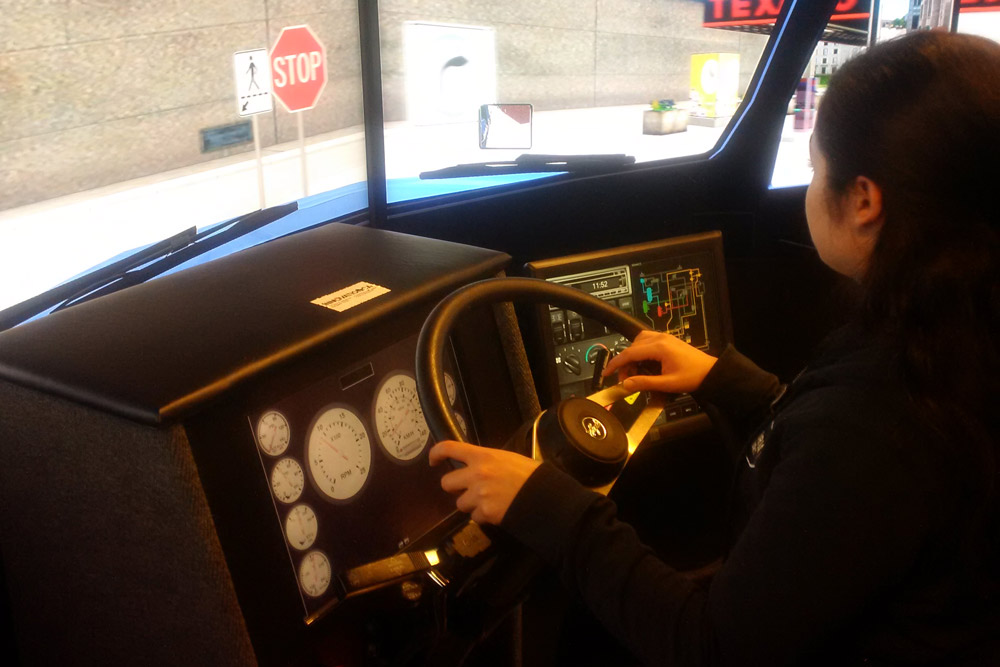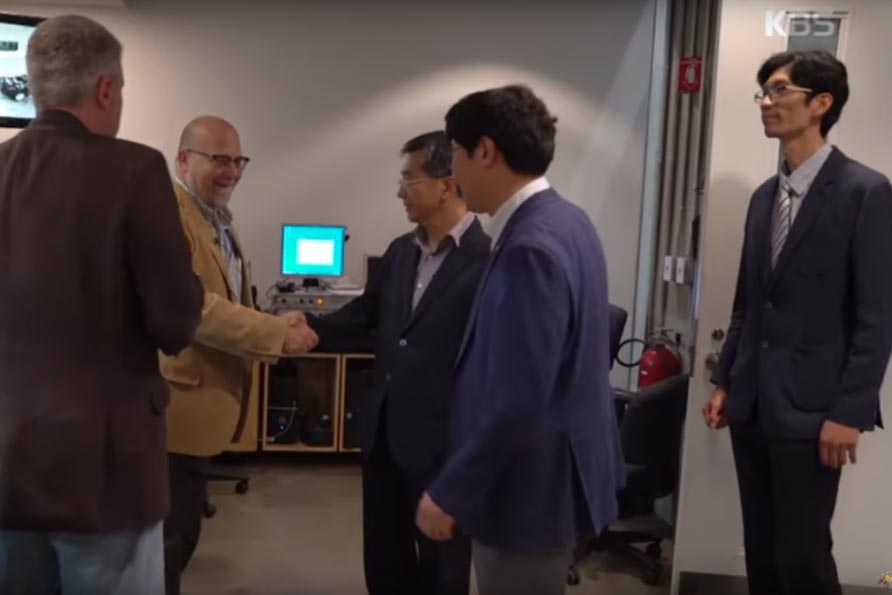Korean TV documentaries showcase University of Ontario Institute of Technology research
University helps profile Fourth Industrial Revolution
January 26, 2018

Geographically, Seoul, Korea and Oshawa, Ontario are pretty much on opposite sides of the world. So what would inspire a television network in Korea to trek more than 10,000 kilometres to record a documentary at the University of Ontario Institute of Technology?
Last summer, producers with the Korean Broadcasting System (KBS) in Seoul were developing plans for a series of television documentaries focusing on the advent of the world’s Fourth Industrial Revolution (4IR).
Largely an extension of the Third Industrial Revolution of the 20th century (characterized by rapid advances in electronics, communication, mechanical devices and an explosion in computer and information technologies), 4IR follows how new technologies connect the worlds of physics, digital and biology and impact disciplines, economies and industries; and how these connections will improve human life. 4IR includes breakthroughs in such areas as artificial intelligence, robotics, 3D printing, autonomous vehicles, quantum mechanics and The Internet of Things.
Looking to tell 4IR’s narrative about the wide overlap between technology, interconnectivity and human communications, the KBS production team wanted to uncover tangible examples at several North American universities. Their list included Johns Hopkins University in Baltimore, Maryland; the Massachusetts Institute of Technology in Cambridge; the Georgia Institute of Technology (Georgia Tech) Technology in Atlanta; and the University of Michigan in Ann Arbor.
But before travelling to the United States, the first KBS campus visit was in Canada, at the University of Ontario Institute of Technology. It was KBS’ only stop north of the U.S. border.
KBS wanted to see ACE, the university’s renowned five-storey climatic wind tunnel facility, which attracts research and industry clients from around the world for its capacity to replicate exact extreme weather, climate and vibration conditions for the dynamic testing of new products and more. The crew explored the control room and had a rare chance to go inside the massive turbine that powers the wind tunnel.
- KBS January 2018 feature of ACE at the University of Ontario Institute of Technology (video runs 4:28; Korean subtitles)
KBS producers also chatted with researchers and graduate students in the Faculty of Engineering and Applied Science about student Capstone research project to develop the prototype for an autonomous military-style vehicle. They also visited FEAS Associate Professor Moustafa El-Gindy’s Truck Driving Simulator Laboratory, which replicates road conditions and tire treads for all types of weather scenarios. Users of the lab experience the simulated look and feel of driving a tractor-trailer, and learn how these large vehicles react in varying conditions.
- KBS January 2018 feature of student Capstone autonomous military-style vehicle and the Faculty of Engineering and Applied Science’s Truck Driving Simulation Laboratory (video runs 2:51; Korean subtitles)
The KBS documentaries featuring interviews, 4IR research and campus footage of the University of Ontario Institute of Technology were broadcast as part of Future 2030, a program that aired across all of South Korea on January 14, 2018.
A pair of professors from Korea’s Kyungwoon University were part of the KBS production delegation. Also accompanying the visit was recently appointed FEAS Assistant Professor Jaho Seo, PhD, whose own Korean research experiences helped provide expertise and translation.
“This visit to our university by the Korean Broadcasting System as well as by Kyungwoon University researchers was a terrific opportunity to widen our university’s international presence,” says Dr. Seo. “The producers uncovered how educational systems respond to 4IR, and they captured how our university is well positioned for that. A large audience in Korea learned about the University of Ontario Institute of Technology for the first time through these documentaries. Perhaps this new awareness will pave the way for future academic collaborations in Korea, student exchange, undergraduate and graduate studies recruitment and future research partnerships for ACE.”
Did you know?
- The University of Ontario Institute of Technology has a Memorandum of Understanding with Sungkyunkwan University in Seoul and an student exchange agreement with Ajou University in Suwon. A new collaboration with Korea University of Technology and Education (KOREATECH) in Cheonan is in development.
Quick fact:
- KBS had also visited the Oshawa-based university once before, in 2012, to learn about the internationally acclaimed pioneering Big Data health informatics research of Canada Research Chair and Faculty of Business and Information Technology Professor, Carolyn McGregor, PhD (2012 KBS feature runs 6:24 on Dr. McGregor’s research website).
Gallery
Media contact
Bryan Oliver
Communications and Marketing
Ontario Tech University
905.721.8668 ext. 6709
289.928.3653
bryan.oliver@uoit.ca





